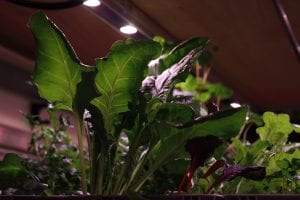LettUs Grow: Low Carbon Food
Engineering Design graduate Charlie Guy founds LettUs Grow with fellow students Ben Crowther and Jack Farmer to produce low carbon food.
Global warming and greenhouse gas emissions are two of the defining problems of our generation. Agriculture is a big piece of the puzzle, producing a third of global emissions. As a company they wanted to tackle some of the biggest problems facing the planet, by reducing the waste and carbon footprint of fresh produce. Their solution was to design and develop aeroponic irrigation and control technology for indoor farms. On World Food Day, they share their thoughts:
June 2020 update
We knew things needed to change, so we devoted ourselves to finding food-focused solutions. By combining our backgrounds in engineering and biology we’ve found innovative ways to help indoor farmers scale up their operations to compete with traditional agriculture. Our novel technology builds on the successes of hydroponics and addresses many of the issues which have been holding back indoor farming.

A common misconception about plants is that they only ‘breathe’ through their leaves, but part of the oxygen and CO2 they use is also absorbed through their roots. By suspending our plants’ roots in the nutrient dense mist rather than in water, we’ve overcome some of the problems faced by hydroponics. Because they’re not submerged, plants can respire optimally during their whole life cycle.
Using this system, called aeroponics, we’ve seen up to a 70% increase in crop yields over hydroponics. As is often the way, aeroponic growing’s biggest strength can also be its greatest downfall. Most systems produce their mist by pushing nutrient-rich water through strips of nozzles.

The small holes quickly become clogged with falling plant debris and a buildup of salts and nutrients, much like how limescale forms inside a kettle. We’ve developed a system without any nozzles, so there is nothing to clog and break. Alongside our patent-pending hardware, we’ve also developed an integrated farm management software system, called Ostara®, which reduces labour requirements, optimises conditions for plant growth and makes farmers’ lives easier.
The incredible weather of 2018 has shown the need for this sort of technology. The UK was ravaged by storms and snow from February to March, scorched by months of temperatures exceeding 30°C during the summer and more snows are predicted before the end of the year. These extreme weather conditions put an enormous strain on farmers. They’re faced with the choice of swallowing their losses or increasing their prices – something tricky to do when at the mercy of supermarkets!


